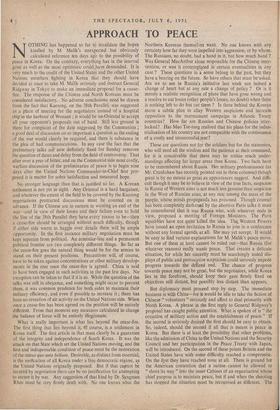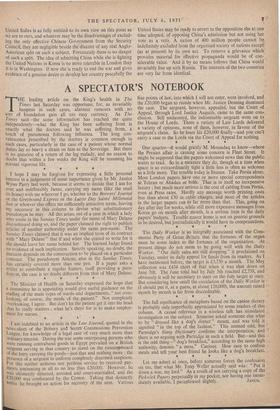APPROACH TO PEACE
NOTHING has happened so far to invalidate the hopes kindled by M. Malik's unexpected but obviously calculated reference ten days ago to the possibility of peace in Korea. On the contrary, everything has in the interval gone as well as the most optimistic could have demanded. It is very much to the credit of the United States and the other United Nations members fighting in Korea that they should have decided at once to take M. Malik seriously and instruct General Ridgway in Tokyo to make an immediate proposal for a cease- fire. The response of the. Chinese and North Koreans must be considered satisfactory. No adverse conclusions need be drawn from the fact that Kaesong, on the 38th Parallel, was suggested as a place of meeting for the negotiators instead of a hospit.al ship'in the harboui of Wonsan ; it would be un-Oriental to accept all your opponent's proposals out of hand. Still less ground is there for complaint of the date suggested by the Communists ; a good deal of discussion on so important a question as the ending of the war would clearly be required, and there is substance in the plea of bad communications. In any case the fact that the preliminary talks are now definitely fixed for Sunday removes the question of dates and delay from the field of controversy. That after over a year of bitter, and on the Communist side most costly, warfare discussion of the preliminaries of peace is to begin nine days after the United Nations Commander-in-Chief first pro- posed it is matter for sober 'satisfaction and measured hope.
No stronger language than that is justified so far. A Korean settlement is not yet in sight. Any Oriental is a hard bargainer, and whatever the extent of the field to be covered by the Kaesong negotiations protracted discussions must be counted on in advance. If the Chinese are in earnest in wanting an end of the war—and in view of their losses and their failure even to hold the line of the 38th Parallel they have every reason to be—then a cease-fire should be arranged without much difficulty, though if either side wants to haggle over details there will be ample opportunity. In the first instance military negotiation must be kept separate from political. An armistice-line and a permanent political frontier are two completely different things. So far as the cease-fire goes the natural thing would be for the armies to stand on their present positions. Precautions will, of course, have to be taken against concentrations or other military develop- ments in the rear once the cease-fire is agreed. China is said to have been engaged in such activities in the past few days. No exception can be taken to that if it is so. While the question of the talks was still in abeyance, and something might occur to prevent them, it was common prudence for both sides to maintain their military efficiency, and even if possible to increase it ; there has been no cessation of air activity on the United Nations side. When once a cease-fire has been agreed on the position will be entirely different. From that moment any measures calculated to change the balance of force will be entirely illegitimate.
What is really important is what lies beyond the cease-fire. The first thing that lies beyond it, of course, is a settlement in Korea itself. The first article in that must clearly be a guarantee of the integrity and independence of South Korea. It was the attack on that State which set the United Nations moving, and the first and indispensable, condition of peace must be the restoration of the status quo ante bellum. Desirable, as distinct from essential, is the unification of all Korea under a free democratic regime, as the United Nations originally proposed. But if that cannot be secured by negotiation there can be no justification for attempting to secure it by war. Any suggestion of that kind by Dr. Syngman Rhee must be very firmly dealt with. No one knows what the Northern Koreans themselves want. No one knows with any certainty how far they were impelled into aggression, or by whom. The Russians, no doubt, had a hand in it, but how much hand ? Was General MacArthur alone responsible for the Chinese inter- vention, or was it contemplated in certain eventualities in any case ? These questions, in a sense belong to the past, but they have a bearing on the future. So have others that must beasked. Are we to see in Russia's initiative last week not indeed a change of heart but at any rate a change of policy ? Or is it merely a realigtic recognition of plans that have gone wrong and a resolve to cut losses (other people's losses, no doubt) when there is nothing left to do but cut them ? Is there behind the Korean move a subtle plan to allay Western suspicions and increao opposition to the rearmament campaign in Atlantic Treaty countries? How far are Russian and Chinese policies inter- locked? Has Mao Tse-tung realised that his plans for the indus- trialisation of his country are not compatible with the continuance of a, costly and unsuccessfulxar?
These are questions not for the soldiers but for the statesmen, who will need all the wisdom and the patience at their command, for it is conceivable that there may be within reach under- standings affecting far larger areas than Korea. Two facts have to be remembered about Russia. Her military predominance (as Mr. Crankshaw has recently pointed out in these columns) thdugh great is by no means as great as appearances suggest. And diffi- cult though it may be to believe in view of the true facts, suspicion in Russia of Western aims is not much less genuine than suspicion in the West of Russian aims, at any rate among the mass of the mple, whose minds propaganda has poisoned. Though counsel has been completely darkened by the abortive Paris talks it must be remembered that it was Russia who, with whatever ends in view, proposed a meeting 'of Foreign Ministers. The Paris squabbles have not quite killed the idea. The, Western Powers have issued an open invitation to Russia to join in a conference without any formal agenda at all. She may yet accept. It would be easy to find various explanations for M. Malik's peace move. But one of them at least cannot be ruled out—that Russia (for whatever reasons) really wants peace. That creates a delicate situation, for while her sincerity must be searchingly tested dis- plays of public and provocative scepticism could seriously impede progress towards the delired end. The chance of progress towards' peace may not be great, but the negotiators, while Korea lies in the forefront, should keep their gaze firmly fixed on objectives still distant, but possibly less distant than appears.
But diplomacy must proceed step by step. The immediate business is with China—for it would be idle to take the fiction of Chinese " volunteers " seriously and affect to deal primarily with North Korea. A phrase in the first reply to General Ridgway's proposal has caught public attention. What is spoken of is " the cessation of military action and the establishment of peace." If the second is seriously desired the first should be easy to obtain. So, indeed, should the second if all that is meant is peace in Korea. But there is at least the possibility that other problems, like the admission of China to the United Nations and the Security Council and her participation in the Peace Treaty with Japan, will be introduced. On the second of these points Britain and the United States have with some difficulty reached a compromise. On the first they have reached none at all. There is ground for the American contention that a nations cannot be allowed to " shoot its way " into the inner Cabinet of an organisation whose chief purpose is to maintain peace, but if and when the shooting has stopped the situation must be recognised as different. The United Stales is as fully entitled to its own view on this point as we are to ours, and whatever may be the disadvantage* of exclud- ing the only effective Chinese Government from the Security Council, they are negligible beside the disaster of any real Anglo- American split on such a subject. Fortunately there is no danger of such a split. The idea of admitting China while she is fighting the United Nations in Korea is no more tolerable in London thap it is in Washington. If now she is ready to end the war and gives evidence of a genuine desire to develop her country peacefully the United States may be ready to revert to the opposition she at one time adopted, of opposing China's admission but not using her vote as a veto. A nation of 400 million people cannot be indefinitely excluded from the organised society of nations except (as at present) by its own act. To remove a grievance which provides material for effective propaganda would be of con- siderable value. And it by no means follows that China would invariably line up with Russia. The interests of the two countries are very far from identical.























































 Previous page
Previous page